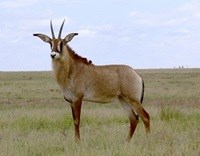
Top stories






More news


Marketing & Media
Ads are coming to AI. Does that really have to be such a bad thing?














Kalahari Wild, a 12,000-hectare farm situated in Grootfontein in the Northern Cape, has taken steps to help conserve some of South Africa's wildlife. The farm runs the Scarce Game Breeding Programme and recently introduced the Roan antelope to this plan. This initiative requires a dedicated team on the ground to ensure the animals' well-being at all times.
The farm is situated in a remote and arid part of the country. Fifty staff are employed to manage the farm and to track the Roan daily by horseback to record their location, physical data, take photos and carry out regular health checks. The staff also migrate the animals across the farm throughout the year to get maximum value out of the limited rainfall and allow for the soil to recover from the damage caused from grazing.
The farm is managed remotely by the Van Der Merwe family who is situated 1,200km away. The family relies on data shared via a central database which is used to analyse trends and plot progress. Although the right processes have been put in place to enable this to happen daily, the farm has traditionally experienced a challenge with the telecommunications infrastructure needed to send the data and access the data centre.
According to Jacques van der Merwe, co-owner of Kalahari Wild, "Mobile coverage in the area is not great. There are no masts and, as the population is so sparse, it doesn't make economic sense for providers to erect masts. Although we've typically relied on the fixed lines in the area, these tend to be problematic as cables are stolen frequently and it's very expensive to replace."
To overcome this challenge, Kalahari Wild looked to Vodacom Business to develop a solution. The company has a variety of broadband offerings designed to meet an array of needs. The Broadband Connect Satellite offering is a solution that can be provisioned anywhere across South Africa and works independently of fixed line connections. The solution is installed and maintained by trained and accredited Vodacom Business installation teams.
The Broadband Connect Satellite service allows van der Merwe to remotely monitor the Roan antelope from his home in the Western Cape. "I can check on the Roan data at any time, talk to the team on the ground, access the latest pictures and compare the tracking data," says van der Merwe.
Looking forward, van der Merwe aims to build a number of tourist retreats on the farm, allowing guests to stay and track the Roan and other wildlife. "We'll need extra bandwidth for this, which is no problem with additional equipment, and we're also planning to put in more sophisticated surveillance system to help control and monitor the animals that will helpfully benefit the whole industry."
"Farming has changed so much in South Africa in recent years. For many, the old ways of farming are just no longer viable - it's more tempting to sell the land to mining firms than to continue farming. I don't think like that. You have to be entrepreneurial. There are many ways in which technology can help the farming industry, to make it more sustainable and attractive to investors."